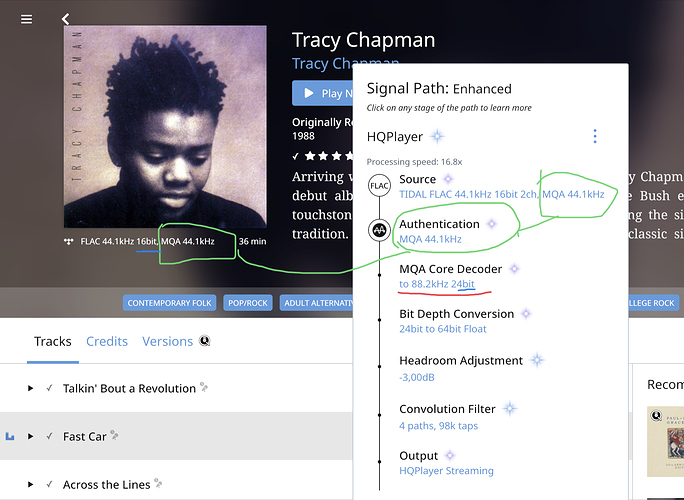As I’m mainly interesting in what actually the decoder do, and would not participate to much in discussion in how many bits, I think it’s been said by Bob Stuart that it’s 15 bit something
However my understanding from reading Bob’s talk, it’s clear to me not all files go through the origami process. He is hiding this a bit in his explanations, and he doesn’t talk much about decoding. Only encoding.
Does any question this understanding about encoding ? This is important to agree upon, as else I can totally understand why some is finding this questioning what a MQA decoder of a MQA 44.1 file does, quite idiotic.
Also you need some bits to create the unfolding. I can’t se one bit is enough.
The transportation rate can maximum be 24/48. That container can contain anything from an MP3 file (not relevant for MQA presently) to a 24/352,8 (or the double) and also 32 bit. Roon displays the final decoded rate that should be expected (by a MQA DAC = original file), in their information about the MQA file. This I hope everybody agrees on. If not we’re into another endless discussion about what Roon displays (MQA metadata).
So a 16/44.1 cannot be folded down to something if we should follow MQA terminology, as the intention was to take hi-res files and fold.
And as it’s displayed as MQA 44.1 kHz, it cannot be doubled to 88.2 in order to obtain an original MQA of 88.2. (Again the decoder displays 88.2 on an authentication of 44.1).
However it can be upsampled. An experiment with no MQA DAC’s and MQA DAC’s with all the MQA settings tested in Roon, shows that Roon what so ever, will display 88.2, even if the DAC states 44.1.
So the DAC must be down sampling. (Unless Roon displays wrong).
If I should make a guess, MQA is adding some sort of filters to the original 16/44.1 digital master, and out comes a MQA 44.1 kHz.
But all Roon has to do is to admit they’re upsampling, (cause filters apply earlier makes this necessary).
As all MQA decoders use the same filter, and @wklie already has confirmed that this MQA SW is also used by Lumin, and he more or less confirms the MQA 44.1 file has been upsampled, we should conclude that the MQA decoder in general, is upsampling all files below 96kHz. (MQA encoded files).
One can speculate the reason for this, but I think answers probably has been given. (Filters).



